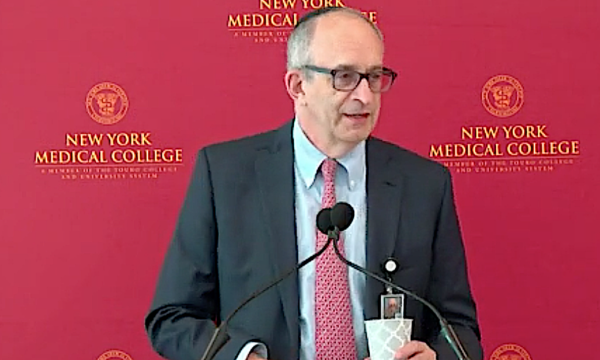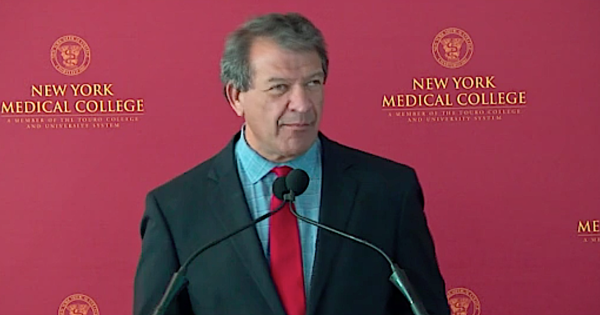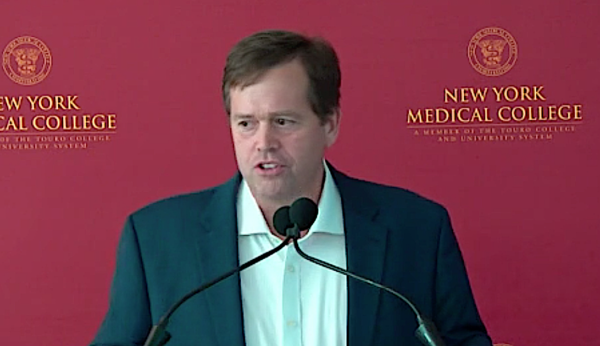As part of a series of events celebrating the 50th anniversary of Touro University of which New York Medical College (NYMC) is a member, a forum took place during which executives from leading firms and institutions in the biomedical field discussed innovation and entrepreneurship.
Salomon Amar, senior vice president for research affairs at Touro, welcomed the guests to the forum and characterized innovation as when people disrupt the model and provide new paradigms by which they function and excel.
Alan Kadish, president of Touro University, talked about technological advancements over the years in his field of interest, cardiology.

“During my career at least we”™ve developed therapies to limit the size of heart attacks,” Kadish said. “The way we treat rapid heartbeats from the lower chamber of the heart and the way we prevent sudden death has changed dramatically over the past few decades and those changes have all been the result of breakthrough technology that was never conceived of when I was training and we”™ve managed to improve the way patients are treated since then.”

Westchester County Executive George Latimer said that biomedical technology is playing a significant role in the county”™s future and he noted the presence of major companies such as Regeneron. He said that the county intends to continue being a good partner with Touro, NYMC and businesses in the medical field.
“This is the future, this is the cutting edge of where the society goes,” Latimer said. “How we grow as a county, how we attract people to live here, how we attract businesses to locate here, they look at an academic institution like New York Medical College as a central attractive entity.”

Mike Oates, president and CEO of the Hudson Valley Economic Development Corporation, who was involved in developing Bioinc, the biotechnology incubator on the NYMC campus in Valhalla, said, “When you peel everything away from our early days of creating biotech as a focused industry here in the valley we knew what we wanted to do was just get smart people in a room. When you get smart people in a room, you get them interacting, you get them communicating and get them resources, and great things happen.”
Speakers from the biotech field who participated in the event included: Peter Fitzgerald, director of the Center for Cardiovascular Technology and Cardiovascular Core Analysis Lab at Stanford University Medical School; Nancy Kelly, president and CEO of Nancy J. Kelly + Associates; Barry Kappel, CEO and president of Sapience Therapeutics; Renee Reijo Pera, president of the McLaughlin Research Institute; Robert Rubin, CEO of the Lovelace Biomedical Research Institute; Allan Dozor, professor at NYMC and president of Boston Children”™s Health Physicians; Fabrice Fischer, CEO of Blu Ltd.; and George D. Yancopoulos, co-founder and president and CEO of Regeneron Pharmaceuticals.
Fitzgerald said that retail medicine practiced at chains such as CVS and Walmart needs to be encouraged in order to treat people who are not accessing proper care through traditional medical practices. He decried the high cost of certain pharmaceuticals such as those approved for certain types of cancers.
Rubin said academic institutions should be supporting and encouraging the development of new approaches to treatments and drugs. He said they should be supporting entrepreneurs in their efforts to find funding for research and development.
“They should be supporting and encouraging the development of new approaches to treatments of human disease. Surprisingly many organizations don”™t really do that in their culture,” Rubin said. “You”™ll find, those of you who have been involved in NIH (National Institutes of Health) funding that frequently the study section rejects really innovative ideas because there isn”™t sufficient supporting evidence to fund the activity and institutions take that view sometimes as well.”
Yancopoulos said that building Regeneron into the multibillion dollar company it is today depended on he and co-founder Leonard Schleifer using what he refers to as “relentless innovation.”
“Starting from the basic science we”™ve gone from the basic science to some of the world”™s leading treatments for diseases ranging from the major causes of blindness, to asthma and other allergic diseases, heart disease, cancer,” Yancopoulos said. “We were the first company to literally start a company and bet it all on mouse genetics.”
Yancopoulos characterized curing disease as the hardest thing that human beings try to do. He pointed out that the pharmaceutical industry spends approximately $200 billion a year on research and development and that 95% of experimental medicines fail.
“Over the last 10 years we”™ve had an incredibly productive stretch for us, probably the most productive stretch in the history of the industry,” Yancopoulos said. “Ten FDA approvals or authorizations over the last 10 years. It”™s all based on our science and our technologies and, of course, our people.”
Yancopoulos said it took over 20 years for Regeneron to get its first drug approval and the company did not become profitable for about 25 years.
“We were mocked by financial analysts as the definitive example of what happens when you put scientists in charge of a business,” Yancopoulos said. “They claimed we didn”™t know what we were doing.”
Yancopoulos said that an important element to success is understanding why you are failing and innovating around it over and over again.
“Back when we started people mocked our ability to actually make drugs and they mocked our ability to actually make money,” Yancopoulos said. “We have this motto at Regeneron, ”˜Doing well by doing good.”™ We do good by trying to cure disease and we hope that the company will then be successful and allow us to do more good. People thought we had no idea of how to actually do that but they thought technologically we were really at the ”˜bleeding edge”™ back then. They just didn”™t appreciate that being at the ”˜bleeding edge”™ back then meant that you could literally change medicine.”
In closing remarks, Edward Halperin, chancellor and CEO of NYMC, said that some things that are hailed as being innovative such as automobile tail fins or kitchen appliances with different finishes are anything but innovative. He questioned some medical advances billed as innovative, such as automation used by surgeons when operating for prostate cancer, that do not directly improve survival rates.
“We as a species seem to be innovation junkies and a lot of it is totally useless innovation,” Halperin said. “Trusting the marketplace to ascertain if innovation is better is clearly a sham and a delusion. There are a lot of innovative products that are profitable but are unnecessary or even harmful.”



















